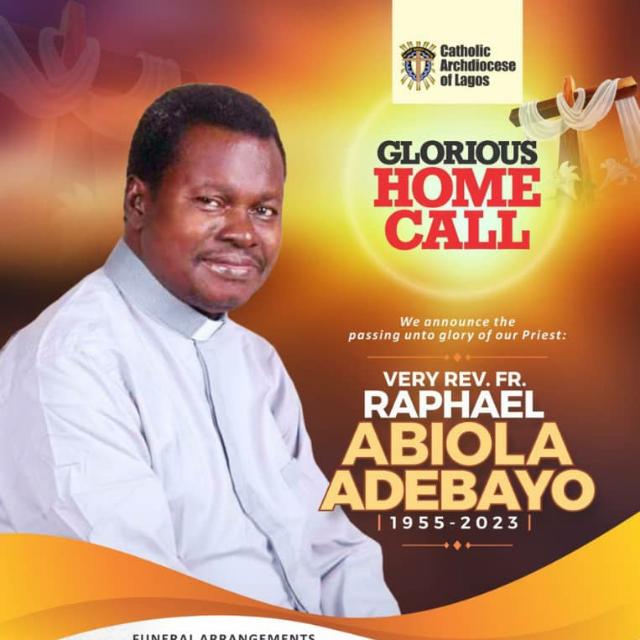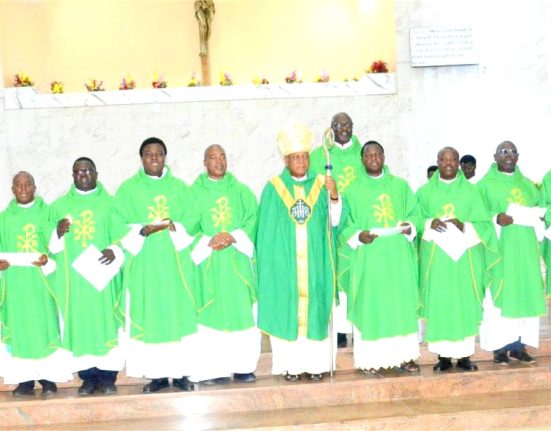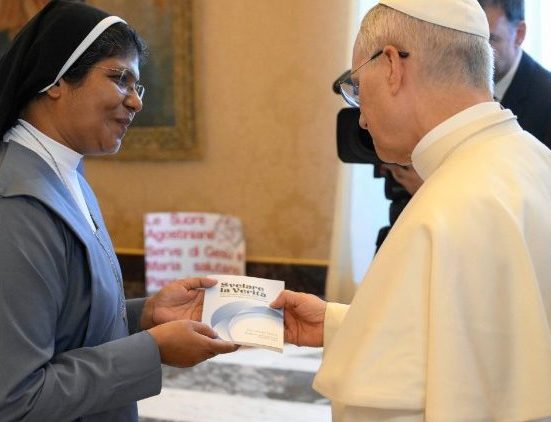Twenty-Ninth Sunday In Ordinary Time Year C
16 October, 2022.
Theme: The Holy Bible, Source Of Wisdom.
My Brothers, Sisters and Friends, on the Third Sunday in Ordinary Time (Year C), 23 January, 2022, we celebrated the ‘Sunday of the Word of God’, established by His Holiness, Pope Francis. Our Theme for that Sunday was, God’s Living Word In The Bible.The ‘Sunday of the Word of God’ is a special day for us to ‘reflect on the inexhaustible (everlasting, impossible to use up) riches in God’s word, to appreciate and witness to it in the world’. Word is described as ‘meaningful unit of language sounds, a meaningful sound or combination of sounds that is a unit of language or its representation in a text.’Word could be a ‘brief utterance, a brief comment, announcement, discussion, or conversation’. We have both the spoken word and the written word. That is, word is conveyed in its spoken form and in its written form. It is either noun or verb. In life, word has a formidable impact.Word is powerful. It can be used positively or negatively. This is why we say in Yoruba, eyin l’ohun, t’oba b’ale, fifo l’oun fo. Literally, this means word is like an egg, and once an egg falls on the ground, it breaks. This teaches us that we think very hard before saying or writing a word.My Brothers, Sisters and Friends, daily, we come in contact with people. Also, through the media (Newspapers, Magazines, Radio, Television, Internet, Movies, Books), we have contact with people as well. These contacts tend to have various impacts on our lives, both individually and collectively.Really, since association with people helps make us the kind of persons we are, we should be selective. Youngsters whose parents or guardians do not care with whom they are associated physically or through the media inevitably hurt themselves.One’s words and actions tend to be the reflections of one’s thoughts, oneself. The books you read and the movies, films, you watch reveal a great deal about yourself. There is an unsurpassed best-seller, known not as ‘a book, but it is known as ‘The Book’, The Holy Bible. It is noteworthy to point out here that it is best-sold, though probably, not best-read, and certainly, not best-understood.My Brothers, Sisters and Friends, as believers, we know that through this medium, the Bible, the source of our wisdom, we relate with God, we associate with God. Actually, we need to realise that the Bible is first a human word, which was written in a time and culture alien to us. The Bible consists of both Old and New Testaments.Thus, it requires some exertion, serious effort, on our part to be understood. Is it worthwhile to put out that effort? Yes. This is because through a human word in the Bible, we discover God’s word. God inspired and guided the sacred writers of the Bible. With this understanding, God is the author of the Holy Bible.The Bible, especially, the New Testament, should never be read in the past tense. In the words of His Holiness, Pope Francis: ‘It is the Story of stories’. The Bible is God’s word to you and me now. Jesus is alive. Indeed, his Spirit is with every Christian.In reading the Bible, we associate with God, if we do it as it should be done, namely, prayerfully and meditatively. Reading the Bible sincerely makes you a different person. Today’s Liturgy deals with prayer and Bible Reading.My Brothers, Sisters and Friends, the First Reading – The Book of Exodus 17:8-13, states: ‘whenever Moses held up his hand, Israel prevailed. That is, as long as Moses kept his arms raised to God in prayer, his people were successful in battle. On their way to the promised land, the Jews passed through the territory controlled by another nomadic tribe, Amalek.A tribal war broke out. Moses picked out a high spot, a small round area, and like the other army commanders of his day, held the staff in his hand. From there he guided the battle. Let us note here that Moses’s staff is called ‘the staff of God’. In Verse 16 of the same Chapter 17, the victory of the people of Israel is expressly attributed to God.We may ask. What does the Sacred writer want to bring out by relating this ancient tradition? His lesson is: God fought on our fathers’ side in the past, and the same God has continued to live, and He will help us now whenever we call on Him sincerely. God is EVER present. Our God is EVER faithful. Our God NEVER fails. God is always prepared to give Himself to us, His children. Even when we abandon Him, He does not abandon us. He is ever consistent. He also calls us to be consistent in following Him and praying to Him.We do not read this passage just for information. It is to guide us wisely in our relationship with God through the prayerful reading of the Bible. My Brothers, Sisters and Friends, as believers, we pray and meditate on the point which God wants to bring out through this narrative. It should be: ‘In the battle of life, I am with you’ (cf. Matthew 28:20). With this in mind, let us make the words of the Responsorial Psalm (121:1-8) our prayer to God.In the Second Reading, 2 Timothy 3:14-4:2, we are told that Scripture is useful for teaching. This is because all Scripture is inspired by God; it is the source of wisdom. Paul charges Timothy to preach this inspired word always. This word of God is sharper than a two-edged sword.Here in this narrative, Paul insists that preachers should know the Bible and use it as the source of the wisdom they preach. With Scripture, the man of God (priest-preacher) is well equipped for his job. This implies that we should listen with faith when the Bible is explained in churches.But why did Paul not recommend Bible reading by all? Simply because Bibles were not printed in his day and the vast majority of the faithful were illiterates. However, in our literate age with Bibles available, we should read prayerfully and meditatively for ourselves (Vatican II: Constitution on Divine Revelation, 22). In reading the Bible, the Word of God, let us continue to apply God’s word to our own life situations, as we do with today’s Bible Readings.My Brothers, Sisters and Friends, the Gospel – Luke 18:1-8, gives us the point to be considered: ‘God will vindicate his elect, who cry to him day and night’. The parable of the poor widow and the judge as told by Jesus in today’s Gospel is to help us to be persistent in prayer (the widow) and to be fair and just in our daily dealings, relationships, with other people (the judge).It is important to pay attention to the point of this parable. Jesus does not compare God with the unjust judge insofar as he is lazy and unconcerned, nor insofar as the reason why he finally gives swift justice in concern. The point is that like the widow, we should persevere in prayer with a great faith. If we do so, God will be with us in the battle of life (Today’s First Reading).To emphasise perseverance in prayer, Jesus tells the parable of the widow who refuses to give up demanding her rights. The lesson of both the First Reading and the Gospel is perseverance in prayer. Please, my Brothers, Sisters and Friends, let the Holy Bible keep being the source of our wisdom.Psalm 121 (Responsorial Psalm)Our help comes from the Lord,who made heaven and earth.I lift up my eyes to the mountains;from where shall come my help?My help shall come from the Lord,who made heaven and earth.Our help comes from the Lord,who made heaven and earth.He will keep your foot from stumbling.Your guard will never slumber.No, he sleeps not nor slumbers,Israel’s guard.Our help comes from the Lord,who made heaven and earth.The Lord your guard, the Lord your shadeat your right hand.By day the sun shall not smite you,nor the moon in the night.Our help comes from the Lord,who made heaven and earth.The Lord will guard you from evil;he will guard your soul.The Lord will guard your going and coming,both now and forever.Our help comes from the Lord,who made heaven and earth. My Brother Sisters and Friends, I will like to congratulate the Governor of Ekiti State, Dr. John Kayode Fayemi, who is finishing his second term as the Governor of Ekiti State today, and handing over to his successor, His Excellency, Mr Abiodun Abayomi Oyebanji.We thank God for what Governor Joh Kayode Fayemi, his wife Erelu Bisi Fayemi, have been able to do and we commend them into God’s hands, both in their present and future endeavours. May God continue to be the source of their strength and inspiration, and may the Bible keep being the source of their wisdom.As I welcome the new Governor and his wife too, I pray that God will grant the new Governor, the seven gifts of the Holy Spirit and the grace to be able to lead the people of Ekiti State, Land of Honour, Land of Integrity, as God wishes.And we pray for the Ekiti People, may we continue to be united in Faith, Hope and Love, and work together to make Ekiti State better than what it is now.God bless us always, God bless our Ekiti State always, God bless Nigeria always and God bless His church always.With confidence in God and Christ being our strength, wherever God leads us, we FOLLOW with joy, commitment and happiness.
Most Rev. Felix Femi Ajakaye
Bishop of Ekiti.











Leave feedback about this